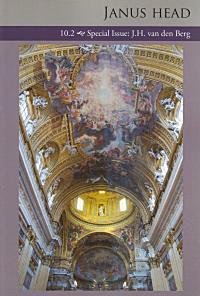 Janus Head Janus Head
10.2
Special Issue
J.H. van den Berg

Travels Inside the Archive
Robert Gibbons
Edge of Maine Editions

Beyond Time
New & Selected Work
1977 - 2007
Robert Gibbons
 The Age of Briggs & Stratton The Age of Briggs & Stratton
Peter Culley
|

Hut on the Bank of a River
1763
Jean-Jacques de Boissieu
b. 30 November 1736
_______________________
Carl Wilson's Let's Talk About Love: A Journey to the End of Taste
a review at the mumpsimus
(....)Because his goal is not to debunk so much as it is to explore, Wilson is able to use the best of what he encounters -- most fruitfully in his clear-eyed application of ideas from Pierre Bourdieu's Distinction: A Social Critique of the Judgement of Taste. Taste is not, for Wilson, merely an expression of social influences and aspirations, but it is partly so, and those parts are often what is most invisible to us when we discuss our aesthetic judgments. He examines a marketing survey of Dion's fans and discovers some surprises:
Widows and grannies aside, what occurs to me is that this midlevel cultural-capital audience is not as far from the average white pop critic as we might have expected. We usually make middling incomes or worse, and while most have university degrees, our expertise is usually more self-taught than PhD-certified, a pattern Bourdieu believed would produce an anxious, fact-hoarding intellectual style in contrast with the relaxed mastery of a fully legitimated cultural elite. (If you've met any pop critics, you'll see his point.) When a critic or heavily invested music buff says, as they often do, that discovering music or writing "saved my life," I think what lurks behind the melodrama is a feeling that a facility with pop culture and words has saved us from the life of subservient career, suburban lifestyle and quiet desperation we imagine befalls people like Céline Dion's white American fans, as well as fans of Billy Joel, Michael Bolton and other midlevel musicians whose names so often serve as epithets. Perhaps our scathing tongues are enacting what Freud called the narcissism of small differences, in defense of what Bourdieu might call a very fragile distinction.
Small differences, though, are essential to anyone's taste ("To have taste at all," Wilson says, "is to exclude"). This is especially true now, in an age of media proliferation, where tastes tend to be at least superficially omnivorous, though to like or even appreciate everything is to like and appreciate nothing, making the subtle distinctions within any omnivorous aesthetic especially powerful. Even omnivorous taste, though, tends to correlate to class and education levels: Wilson cites studies showing that when class includes cultural capital and education (rather than just economic power), the people with the broadest tastes tend to be higher class than people with narrower tastes -- and the few sorts of music that higher class people are willing to categorically dismiss as not to their taste are the sorts of music lower class people tend to cite as their favorites (in 1993 this included rap, heavy metal, country, and gospel; there might be some differences in the catagories today, but the effect would likely be similar)....(more)
_______________________
Distinction: a social critique of the judgement of taste
Pierre Bourdieu
google books
The field of cultural production: essays on art and literature
Pierre Bourdieu
google books
_______________________
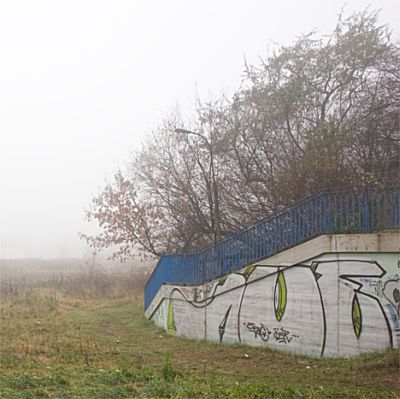
Luis Belmonte Diaz
via Mrs. Deane
_______________________
Why is it that capitalist culture has always been so well provisioned with visions of its own end?
-
ads without products
_______________________
A Tale Of A Tub
Section IX
A Digression Concerning The Original, The Use,
And Improvement Of Madness In A Commonwealth.
Jonathan Swift
...whosoever pleases to look into the fountains of enthusiasm, from whence, in all ages, have eternally proceeded such fattening streams, will find the springhead to have been as troubled and muddy as the current. Of such great emolument is a tincture of this vapour, which the world calls madness, that without its help, the world would not only be deprived of those two great blessings, conquests and systems, but even all mankind would unhappily be reduced to the same belief in things invisible. Now, the former postulatum being held, that it is of no import from what originals this vapour proceeds, but either in what angles it strikes and spreads over the understanding, or upon what species of brain it ascends; it will be a very delicate point to cut the feather, and divide the several reasons to a nice and curious reader, how this numerical difference in the brain can produce effects of so vast a difference from the same vapour, as to be the sole point of individuation between Alexander the Great, Jack of Leyden, and Monsieur Des Cartes. The present argument is the most abstracted that ever I engaged in; it strains my faculties to their highest stretch; and I desire the reader to attend with utmost perpensity for I now proceed to unravel this knotty point. There is in mankind a certain [6]
[6 Here is another defect in the manuscript, but I think the author did wisely, and that the matter which thus strained his faculties, was not worth a solution; and it were well if all metaphysical cobweb problems were no otherwise answered.]
Hic Multa Desiderantur.
And this I take to be a clear solution of the matter. ...(more)
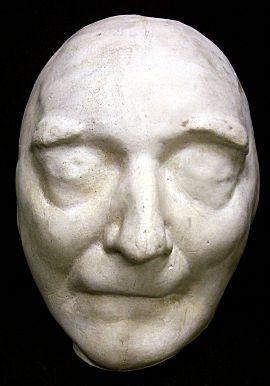
Jonathan Swift
b. 30 November, 1667
The Poems of Jonathan Swift, D.D., Volume 1 and 2
Swift at Project Gutenberg
_______________________
The Beasts' Confession
To the Priest, on Observing how most Men mistake their own Talents
Jonathan Swift
When beasts could speak, (the learned say
They still can do so every day,)
It seems, they had religion then,
As much as now we find in men.
It happen'd, when a plague broke out,
(Which therefore made them more devout,)
The king of brutes (to make it plain,
Of quadrupeds I only mean)
By proclamation gave command,
That every subject in the land
Should to the priest confess their sins;
And thus the pious Wolf begins
...(more)
_______________________
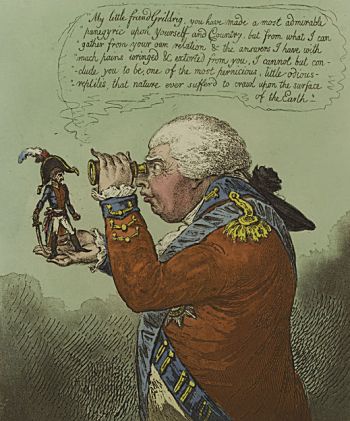
The King of Brobdingnag, and Gulliver
1803
James Gillray
1757-1815
1 2 3
_______________________
A recent magnificent exhibition of the work of the great British caricaturist James Gillray (1756–1815) at the Tate Gallery in London demonstrates that the criticism of morals and manners was not always associated in Britain with puritanism, bigotry, and small-mindedness but on the contrary was once vigorous, joyful, and uproariously funny. Few of the spectators at the exhibition laughed, however: an art gallery being a temple of culture, the nearest thing a modern city has to a functioning cathedral, it would have been sacrilege to have smiled, let alone to have emitted a sound indicating amusement. I noticed the same strenuously poker-faced deportment at the exhibition of the work of Honoré Daumier in the Musée d’Orsay in Paris shortly before, a deportment that, in the light of the wonderfully funny material, can only be described as heroic.
- Theodore Dalrymple, Gillray's Ungloomy Morality
_______________________

Hudson's Bay Lemming
John Woodhouse Audubon
1812-1862
_______________________
Try To Praise The Mutilated World
Adam Zagajewski
Translated by Renata Gorczynski
Try to praise the mutilated world.
Remember June's long days,
and wild strawberries, drops of wine, the dew.
The nettles that methodically overgrow
the abandoned homesteads of exiles.
You must praise the mutilated world.
You watched the stylish yachts and ships;
one of them had a long trip ahead of it,
while salty oblivion awaited others.
You've seen the refugees heading nowhere,
you've heard the executioners sing joyfully.
You should praise the mutilated world.
Remember the moments when we were together
in a white room and the curtain fluttered.
Return in thought to the concert where music flared.
You gathered acorns in the park in autumn
and leaves eddied over the earth's scars.
Praise the mutilated world
and the grey feather a thrush lost,
and the gentle light that strays and vanishes
and returns.
_______________________
from Rereading Rilke:
Introduction to The Poetry of Rilke
Adam Zagajewski
The material absence of modern history in Rilke's work will intrigue or even dismay some of his readers. Let us quote one of them, Mieczyslaw Jastrun (1903-83), an eminent Polish poet and a seasoned translator of Rilke's (and Hoderlin's) poetry.
I owe to Jastrun many rich hours and one particular luminous moment, many decades ago, when, still a high school student, I bought a slim, elegant book, Duino Elegies, in his translation. Standing in the street filled with the mediocre din of a lazy Communist afternoon, I read for the first time the magical sentences "Who, if I cried out, would hear me among the Angels' / Orders? And even if one of them pressed me / suddenly to his heart: I'd be consumed / in his more potent being. For beauty is nothing / but the beginning of terror, which we can still barely endure." The street suddenly disappeared, political systems evaporated, the day became timeless, I met eternity, poetry woke up.
This book was a jewel in my then still very modest library—as opposed to the library of my parents, which was quite well stocked, mostly with novels and short-story collections; don't we live in an age of prose? I loved the forrmat of the Rilke volume—slightly bigger than the conventional size—and the sheer fact that this sequence of ten poems merited a separate edition. This was at a time when I was addicted to fat Russian novels I'd check out from the municipal library. The very slenderness of the Elegies made me wonder about the weight of words: if a thin volume can have so much significance, why carry the epic loads? ...(more)
_______________________
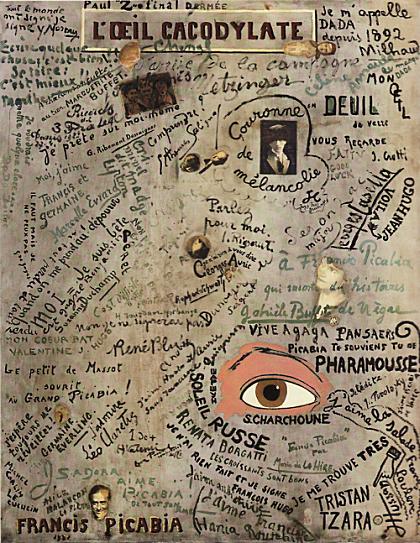
The Cacodylic Eye
1921
Francis Picabia
_______________________
December
Adam Zagajewski
Translated by Clare Cavanagh
December, herald of destruction,
takes you on a long stroll
through the black torsos of trees
and leaves scorched in autumn’s fire,
as if to say: so much then for
your secrets and your treasures,
the fervent trill of small birds,
the promises of summer months.
Your dreams have been dissected,
the blackbird’s song now has a rationale,
plants’ corpses clutter the herbarium.
Only the laboratory’s hard stone remains.
Don’t listen: they may take everything away,
but they can’t have your ignorance,
they can’t take your mysteries, strip you
of your third homeland.
Don’t listen: the holidays draw near
and frozen January, snow’s white paper.
What you’ve waited for is being born.
The one you’re seeking will begin to sing.
Poems by Adam Zagajewski at Samizdat
Adam Zagajewski at Poetry International Web
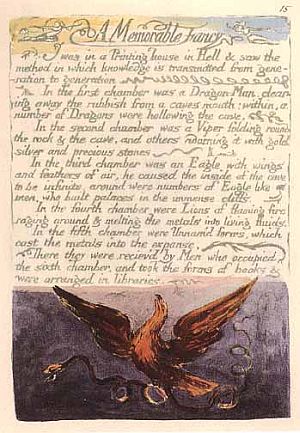 William Blake
b. November 28, 1757
A Memorable Fancy.
I was in a Printing house in Hell & saw the method in which knowledge is transmitted from generation to generation.
In the first chamber was a Dragon-Man, clearing away the rubbish from a cave's mouth; within, a number of Dragons were hollowing the cave.
In the second chamber was a Viper folding round the rock & the cave, and others adorning it with gold silver and precious stones.
In the third chamber was an Eagle with wings and feathers of air: he caused the inside of the cave to be infinite, around were numbers of Eagle like men, who built palaces in the immense cliffs.
In the fourth chamber were Lions of flaming fire raging around & melting the metals into living fluids.
In the fifth chamber were Unnam'd forms, which cast the metals into the expanse.
There they were reciev'd by Men who occupied the sixth chamber, and took the forms of books & were arranged in libraries.
-
William Blake, The Marriage of Heaven and Hell
_______________________
 Creek
Izu, Japan
2008
Shinjosui - Mind Like Water
Rolfe Horn
Scott Nichols Gallery
via gmtPlus9 (-15)
_______________________
"Yes, we need one another in deep, strange ways."
A Letter From James Wright
from A Wild Pefection: The Selected Letters of James Wright
courtesy of Greg Rappleye
You kind letter made me happy. Poetry is a strange adventure: at crucial times it is––it has to be a search undertaken in absolute solitude, so we often find ourselves lost in loneliness––which is quite a different thing from solitude. America is so vast a country, and people who value the life of the spirit, and try their best to live such a life, certainly need times and places of uncluttered solitude all right. But after the journey into solitude––where so many funny and weird and sometimes startlingly beautiful things can happen, whether in language or––even more strangely––in the silences between words and even within words––we come into crowds of people, and chances are they are desperately lonely. Sometimes it takes us years––years, years!--to convey to another lonely person just what it was we might have been blessed and lucky enough to discover in our solitude....(more)
_______________________
Parrhesia: A Journal of Critical Philosophy
A Journal of Critical Philosophy
issue 7, 2009
On the occasion of the forthcoming publication of the English translation of Gilbert Simondon’s L’individuation psychique et collective, Parrhesia is publishing its first themed issue, dedicated entirely to Simondon. Given the importance of Simondon’s thought for continental philosophy, this translation constitutes nothing less than an event within the journal’s field of interest—not just because of Simondon’s importance for the work of, most notably, Gilles Deleuze, but also because of his central place in the work of contemporary philosophers such as Bernard Stiegler, whose essay on Simondon and Heidegger is published here in English for the first time.
_______________________
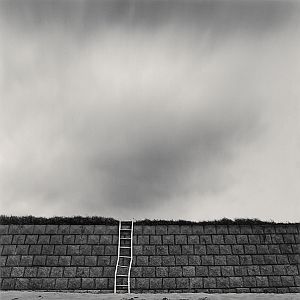
Public Ladder
Choshi Beach, Japan
2008
Rolfe Horn
1 2
_______________________
Pietas
Philip White
agni
For the day to come, for the green of the tree,
some violence would be required.
Consider the thistle’s alizarin dial, so poised
on medieval weaponry:
some violence would be required.
That the foundation be laid, the association
not founder, that language be believed,
some violence would be required.
...(more)
_______________________
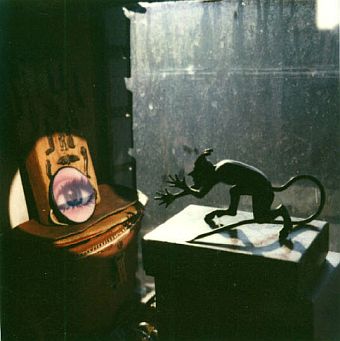
Elizabeth and Me
André Kertész
Stephen Daiter Gallery
_______________________
Empedocles: European Journal for the Philosophy of Communication
Volume 1 Issue 1
November 2009
The Soul of the Golem [pdf]
Daniel H. Cabrera
Empedocles
Abstract
There are many ways of interpreting the so-called ‘new technologies’. One of the most interesting is that which stems from defining them as a social imaginary, and therefore, as collective beliefs, fears and hopes. It is common to attribute to technologies all manner of threats that, founded or not, are real in the measure that the society makes decisions and acts in a way consistent with this conviction. The fears and anxieties of society lead to a consideration of the limits of the human that technologies transgress. Among the figures with which one speaks about these limits there is Frankenstein, the modern Prometheus, which threatens modern fantasies with its deformity. There is, however, another man-made creature that can serve to orient our reflection, the Golem. In 1609, 400 years ago, Rabbi Loew died. He is credited with the creation of a homunculus by combining of secret codes. The problem of the Golem was its imperfect soul made manifest in its lack of speech. Its silent presence was a source of great fear in the community that finally asked to get rid of the creature. These figures of monstrosity, Frankenstein and above all Golem, will help us to make technologies understand from the fear that society projects onto them, and this will lead us to the question concerning the imaginary fears of the technological system.
via Philosophy's Other: Theory On The Web
_______________________
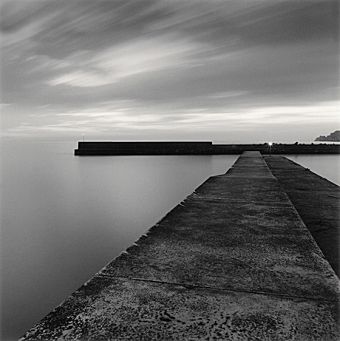
Fishing Harbor
Matsushima, Japan
2008
Rolfe Horn
_______________________
Charles Darwin: Conservative Messiah?
On Joseph Carroll's Literary Darwinism
Bruce Clarke
electronic book review
The legacy of Charles Darwin remains as vexed as ever. In my part of the States, a debate over Darwin is played out on the backs of cars. To signify their theological commitments, some affix plastic silhouettes of fish to their bumpers or trunks. Sometimes the point is driven home by placing the name "Jesus" inside the fish. The occasional secularist joker lampoons these logos with a parodic variation that gives the fish tiny feet and a little smile. These turn it into a lizard, presumably from the Galapagos Islands, and often the point is made explicit by inscribing "Darwin" inside the creature's body. Not to be outdone, others then signify their opinion of "Darwin" and his supposed challenge to their construction of the Deity with a composite display in which the Darwin lizard finds itself within the jaws of an even larger Christian fish. So much for turning the other cheek: a world religion of social tolerance and a universal science of natural history are perverted into rival caricatures and reduced to tattoos on the asses of automobiles. In yet another variation, however, which has yet to appear on a bumper, Jesus and Darwin merge into a composite savior. While the salvational Darwin has yet to gel into a specific logo, it is implicitly affixed to the pages of Carroll's Literary Darwinism.(....)
Ignoring the most significant developments of media and medium theories out of those postmodern discourses - from deconstruction and discourse theory to cybernetics and systems theory - that have taken proper cognizance of the "materialities of communication" and the semiotic embodiments of psychic and social forms, Carroll issues comments such as the following from "The Deep Structure of Literary Representations":
Writing is an extension of oral communication. Literacy is less than 10,000 years old, and it should be clear that no claim is being made here that literacy and its offshoots are themselves [evolutionary] adaptations. When I speak of the adaptive functions of literature, I mean to signify the adaptive functions of the oral antecedents of written stories, poems, and plays. The same arguments that apply to these oral forms will be understood as extending also to their counterparts in written language.
In this passage, the mockery of McLuhanism embedded in the term "extension" only makes more palpable the disappearing of media matters from Carroll's constructions. Even the word "speech" is absent, replaced by the pseudo-technical phrase "oral communication." The word "language" barely makes an appearance, and then only as modified by the distasteful Derridean qualifier "written."
This writing off of writing as a negligible epiphenomenal "offshoot" of spoken language strikes me as an especially astonishing and revelatory repercussion of Carroll's larger argument. While it helpfully makes explicit the vacuous if "inexorable logic of the adaptationist program," it also clarifies the inadequacies of that program as a basis for a "scientific" theory of literature. Ironically, the effort to think literature from the stance of Darwinian time squeezes out any historical "empiricism" from a theory complacently content to dismiss the profound cultural distinctions founded on the differentiation of orality from literacy. By discounting the millennial developments of communications technologies from writing onward and their psychic and social upheavals as so much cultural frippery, this argument about the "adapted mind" and its normative "human nature" as an evolutionary fait accompli shows its anti-modern hand, and in the same gesture, strikes itself down. As Bruno Latour summed it up at the end of We Have Never Been Modern, "Regrettably, in the antimoderns I see nothing worth saving"....(more)
_______________________
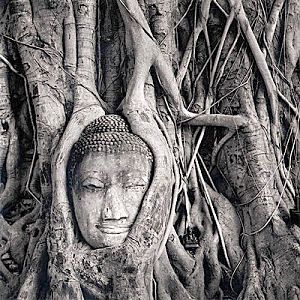
Holding Buddha
Ayutthaya, Thailand
2000
Rolfe Horn
_______________________
The ancient Poets animated all sensible objects with Gods or Geniuses, calling them by the names and adorning them with the properties of woods, rivers, mountains, lakes, cities, nations, and whatever their enlarged & numerous senses could percieve.
And particularly they studied the genius of each city & country, placing it under its mental deity.
Till a system was formed, which some took advantage of & enslav'd the vulgar by attempting to realize or abstract the mental deities from their objects; thus began Priesthood.
Choosing forms of worship from poetic tales.
And a length they pronounced that the Gods had ordered such things.
Thus men forgot that All deities reside in the human breast.
-
William Blake, The Marriage of Heaven and Hell
_______________________
Ad Emendationem Blogosphaerae
Justin E. H. Smith
I believe there is a sort of moral calling to insist upon not going along with the daily news cycle, not posting reactions, positive or negative, to the latest ejaculation of Sarah Palin or the latest pseudo-defiant riff by Jon Stewart, as if anything really rode on this, but rather to ensure, as our culture makes its inevitable transition to the entirely digital stage of its evolution, that what came before does not get lost, that what has least of all a place in the daily news cycle nonetheless is made to have a place among the subaltern currents constituting the blogosphere. In other words, it's come to seem to me that 'blogging', if that's what it must be called, about the burial practices of the Scythians, or about illuminated manuscripts, is itself a form of resistance....(more)
_______________________
Philippe Lacoue-Labarthe: Representation and the Loss of the Subject
John Martis
pdf at aaaarg
_______________________
Ellipsis: Of Poetry and the Experience of Language after Heidegger, Hölderlin, and Blanchot
William Allen
pdf at aaaarg
_______________________
Experience and Distance: Heidegger, Blanchot, Levinas
Paul Davies
1989 doctoral thesis from University of Sussex
pdf at aaaarg
_______________________

Fukuura Island
Matsushima, Japan
2008
Rolfe Horn
_______________________
Joan Didion Crosses the Street
V.L. Hartmann
the morning news
When I was a teenager my mother explained the ‘60s and ‘70s to me by giving me her worn copies of Joan Didion’s collected essays. Haight-Ashbury was Slouching Towards Bethlehem, Howard Hughes was “7000 Romaine, Los Angeles 38.” I knew “John Wayne: a Love Song” before I had any idea who John Wayne was. My mother read these titles off to me with a deep reverence and it sounded like a different language. This was before I knew writers to have distinct styles. I would not understand the full meaning of many of the cultural references in Didion’s work until later re-readings in college, but I learned to associate the eras of my parents’ youth with the severe rhythm of a Didion sentence. I did not see Didion’s style as belonging to Didion; I saw it simply as the way sentences were written before I was born. ...(more)
_______________________
Around the pillars of Urthona, and round thy dark limbs,
On the Canadian wilds I fold, feeble my spirit folds.
-
William Blake, America A Prophecy
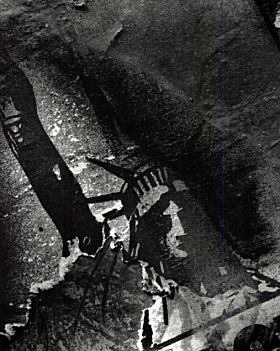
Statue of Liberty
Manhattan Wall Series
Louis Stettner _______________________
What 20th-Century Theorists Have to Say about Our World Today
Amy Stambach
One day, way back in the 20th century, Michel Foucault, Jacques Lacan, Claude Lévi-Strauss, and Roland Barthes sat under an equatorial tree, living in their own imagined primitive past, discussing Global Studies. “What,” asked Barthes, “might the four of us contribute to a field that analyzes the world as a global system, stitched together—as Michael Curtin deftly puts it—by trade protocols, governance covenants, and communications networks?” Lévi-Strauss checked his notes, Lacan thought introspectively, and Foucault answered complicatedly. Each spoke of the cultural schemes that inform public policy and that structure debate about contemporary life. Let me summarize their conversation—translated from French....(more)
global-e: a global studies journal
_______________________
 Water Rising
Louis Stettner
1990
_______________________
"There’s a lot of accidental love in the world despite so much crass indifference."
Thus began the first post at Robert Gibbons log
Two years later he concludes the two year series (Nov. 24, 2007 - Nov. 25, 2009) Disembarking
Robert Gibbons
Disembarking the craft carried me around the world for two years & two days,
writing, blank pages & blank screens, not always real seas, nor Charybdis, I greet
you simply, as a Martinique fisherman does returning to port, “Still alive.”
technical glitches have prevented this from being added on line yet
_______________________
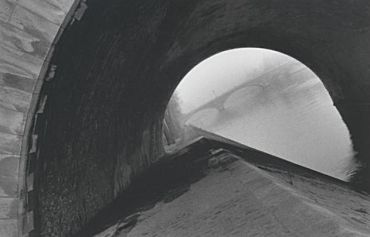
Near Musee d'Orsay
Louis Stettner
1987
_______________________
... when I go off for my morning trek against the sea, where autumn continues to draw back summer’s flora revealing monumental stones & scree, what do I imagine but lines of her body & ears for hearing to speak in response. When I return to look up the plural of orifice, pervading contemplation, I’m given the example: orifices of wounds. Love marks this skin of language without scarring.
-
Robert Gibbons, Skin of Language
_______________________
Poets and Artists
December 2009
edited and produced by Didi Menendez
issuu
_______________________
The Future of the Image
Jacques Rancière
aaaarg - free reg. req.
_______________________

Friends of Phil Agre
Missing Since 2008/2009
Phil Agre, an appreciation
Omniorthogonal
... he had the intellectual courage to defy the dominant MIT sensibilities and become not just an engineer but a committed critic of the ideology under the surface of technology, especially as it was applied to artificial intelligence. He was a leader of the situated action insurgency in AI, a movement that questioned the foundations of the stale theories of mind that were implicit in the computational approach. Phil had the ability to take fields of learning that were largely foreign to the culture of MIT (continental philosophy, sociology, anthropology) and translate them into terms that made sense to a nerd like me. ....
Phil was a seminal figure in the development of Internet culture. His Red Rock Eater email list was a early predecessor to the many on-line pundits of today. Essentially he invented blogging, although his medium was a broadcast email list rather than the web, which didn't yet exist. He would regularly send out long newsletters containing a mix of essays, pointers to interesting things, and opinions on random things. He turned email into a broadcast medium, which struck me as weird and slightly undemocratic at the time, but he had the intellectual energy to fuel a one-man show, and in this and other matters Phil was just ahead of the times -- now the web is stuffed to the brim with outsized personalities, but it wasn't so back then....(more)
Red Rock Eater News Serviceinternet archive
_______________________
Anyone who has paid attention to the growing number of evangelical zealots over the past couple of decades must be aware that there is a growing chasm between Religion and Christianity. Today, the term, "religious Christians" is nothing if not oxymoronic. It seems when folks become apocalyptic frothing-at-the-mouth religious, they ultimately stray from the light and life of Christianity, while descending deeper into the darkness and death of Religion.
- Sheila Samples, God Has Left The Building
_______________________
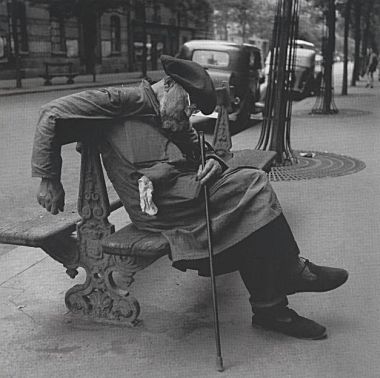
Peintre de Chevalet
Boulevard Montparnasse - 1951
Louis Stettner
_______________________
Cartographies of Silence
Adrienne Rich
1.
A conversation begins
with a lie. and each
speaker of the so-called common language feels
the ice-floe split, the drift apart
as if powerless, as if up against
a force of nature
A poem can being
with a lie. And be torn up.
A conversation has other laws
recharges itself with its own
false energy, Cannot be torn
up. Infiltrates our blood. Repeats itself.
Inscribes with its unreturning stylus
the isolation it denies.
(....)
3.
The technology of silence
The rituals, etiquette
the blurring of terms
silence not absence
of words or music or even
raw sounds
Silence can be a plan
rigorously executed
the blueprint of a life
It is a presence
it has a history a form
Do not confuse it
with any kind of absence
(....)
8.
No. Let me have this dust,
these pale clouds dourly lingering, these words
moving with ferocious accuracy
like the blind child's fingers
or the newborn infant's mouth
violent with hunger
No one can give me, I have long ago
taken this method
whether of bran pouring from the loose-woven sack
or of the bunsen-flame turned low and blue
If from time to time I envy
the pure annunciation to the eye
the visio beatifica
if from time to time I long to turn
like the Eleusinian hierophant
holding up a single ear of grain
for the return to the concrete and everlasting world
what in fact I keep choosing
are these words, these whispers, conversations
from which time after time the truth breaks moist and green.
...(more)

Lights and Shadows of a Shattered City _______________________
Neurocapitalism
Ewa Hess, Hennric Jokeit
Translation by Melanie Newton
eurozine
There is good reason to assert the existence, or at least the emergence, of a new type of capitalism: neurocapitalism. After all, the capitalist economy, as the foundation of modern liberal societies, has shown itself to be not only exceptionally adaptable and crisis-resistant, but also, in every phase of its dominance, capable of producing the scientific and technological wherewithal to analyse and mitigate the self-generated "malfunctioning" to which its constituent subjects are prone. In doing so – and this too is one of capitalism's algorithms – it involves them in the inexorably effective cycle of supply and demand.
Just as globalisation is a consequence of optimising the means of production and paths of communication (as Karl Marx and Friedrich Engels predicted), so the brain, as the command centre of the modern human being, finally appears to be within reach of the humanities, a field closely associated with capitalism. It may seem uncanny just how closely the narrow path to scientific supremacy over the brain runs to the broad highway along which capitalism has been speeding for over 150 years. The relationship remains dynamic, yet what links capitalism with neuroscience is not so much strict regulation as a complex syndrome of systemic flaws. ...(more)
_______________________
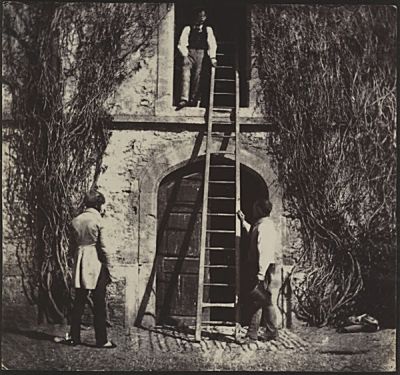
The Ladder
May 1845
William Henry Fox Talbot
Points of View:
Capturing the 19th Century in Photographs
Paccar Gallery at the British Library
_______________________
Prose poems
John Gallaher
Winner of the twelfth annual Boston Review poetry contest
A Guidebook to Patch-of-Ground People
Here in Hopperville, it’s all about somewhere else really, stretching back to bards and shamans, and closing with a sequence that features us waving there behind the county bake-off. So, who’ll vouch for this among the kickshaws? the candidates wonder, two-stepping out onto the Indian burial mound. It’s where I mainly grew up, they add, tracing out the contours of local space with a bit of it on their fronts. So we’ve been looking, good hygiene permitting, for some time now. Rosie was mostly happy though, and knew that all would one day be another day. If I say “multifarious” will you think “goings on”? If I say “hooves” will you think “horses”? Among the vast dissemination of secondary objects, the idea of a town enters the town. It’s locally called the bladed-dirt road.
...(more)
via The Page
_______________________
On the Edge of the Cliff. History, Language, and Practices
Roger Chartier
translated by Lydia G. Cochrane
1997
available here (aaaarg - free reg. req.)
_______________________
Torture: The Greased Pig Of Our Perilous Existence
Robert Billyard
Vive Le Canada
As long as this not so cuddly little pig has the run of the house all of us get smeared and the blame does not lie totally with our leaders. We too are refusing to wrestle this not so cuddly little pig as we drift toward being torture tolerant societies. Stark testimony to this is not only our lack of outrage to torture connected to the less than authentic war on terror but also domestic torture. Domestic torture comes in the form of our apparent tolerance for the use of the tasers by our police forces. Both the UN and Amnesty International consider the taser a form of torture. It was never intended as a lethal weapon, but it now has a proven lethality, and a growing list of victims....(more)
_______________________
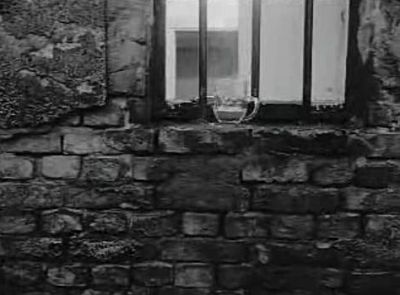
still from Damnation
.....................................................
Karrer's monologue from Bela Tarr's Damnation
courtesy of spurious
I sit by the window and look out completely in vain. For years and years I've been sitting there and something always tells me I'll go mad the next moment. But I don't go mad the next moment, and I have no fear of going mad because fear of madness would mean that I'd have to cling to something. Yet I don't cling to anything. I cling to nothing, but everything clings to me.
They want me to look at them. To look at the hopelessness of things. To watch as a scruffy dog outside my window under the pewter sky in the torrential rain walks up to a puddle and has a drink. They want me to watch the pitiful effort everyone makes in trying to speak before they drop into the grave. But there's not time for they are already falling. And they want this irreversibility of things to drive me mad, but the next second they want me not to go mad.
...(more)
_______________________

High Street Glasgow
1868
The Old Closes and Streets of Glasgow
Thomas Annan
_______________________
Deconstructing The Demiurge: Eschatology of Reason
"The Gilded Index of Far-Reaching Ruin"
Carlo Parcelli
FLASHPOINT
I: A Brief Course in Secular Eschatology
In this rift,
Among these books towering above me
The war between Heaven and Hell rages.
To some by their very substantiation,
Heaven and earth were unified.
“But they were wrong.”
The mind fractures and
Ancient fault lines are manifest,
The body and blood,
Dionysus, Orpheus, the Prophet and
The apocrypha of Alkan crushed by his Talmud.
Or like Charles-Valentin-- Gillespie, Parker and Charlie Christian,
The free masonry of be-bop, its
Insurmountable technical problems
Designed to damn the poser,
The Skull and Bones of flatted fifths.
Lord, I am the scourge of human engineering. Hear my taunt.
Mostly it’s a Te Deum to tedium,
But then the tree line lit up so close
We took mud and bone incoming.
And ever since some go in and out;
Some came back with a vestigial tail.
Some were taken up meek and treacly.
But most are bitter and abandoned.
And a very few angry and dogged.
Next to plastic jugs of mixed nuts, adrenal,
Diving from the strobe of a ceiling fan,
Regrouping at the rows of Mossbergs and BARs pointed heavenward,
Laying down cover,
Keeping the angels pinned down behind the cumulus
While I make my getaway.
High noon in the big box store
Scattered among the pixelations on the High Def TV
Sucked toward the white light beyond, thinking, Kyrie Eleison,
Will they have their way and pixelate me?
“Mam, my arm. Touch my arm! Please, mam, TOUCH ME!”
Carbatrol, depakote, klonopin, lampictal, risperdal,
Topamax, thorazine, lithium, tofranil, seroquel;
Ten miracle drugs
For every one miracle in the bible,
For every sustainable superstition.
Transubstantation works for loaves and fishes, bread and wine,
Snakes and sticks, even Lazarus;
When Christ deejayed and catered Canaan,
Did he collect dove droppings
For his nanobox off the copper roof
At the Roman Legion’s gymnasium and wedding hall,
Because, shit to sangria, that Nazarene kid has kept that party hopping?
...(more)
_______________________

Coming home from the marshes
c.1886
Peter Henry Emerson
_______________________
And so they went on, the fourbottle men, the analists, ungu-am and nunguam and lunguam again, their anschluss about her whosebefore and his whereafters and how she was lost away away in the fern and how he was founded deap on deep in anear, and the rustlings and the twitterings and the raspings and the snappings and the sighings and the paintings and the ukukuings and the (hist!) the springapartings and the (hast!) the bybyscutt-lings and all the scandalmunkers and the pure craigs that used to be (up) that time living and lying and rating and riding round Nunsbelly Square. And all the buds in the bush. And the laugh-on the greene, agirlies, the gretnass of joyboys, from Pat Mullen, Tom Mallon, Dan Meldon, Don Maldon a slickstick picnic made in Moate by Muldoons.
-
Joyce, Finnegan's Wake

memory machine
Libeskind’s Machines
Lebbeus Woods on Daniel Libeskind
...the vogue for a linguitic interpretation of architecture has passed, and the avant-garde has moved on, or at least elsewhere. Libeskind’s machines, inspired by reading and writing and implicitly interpreting texts, as well as memory (treated as text), would be of little interest today if the machines were only didactic illustrations of theory. But they are much more. As objects of design, they have powerful presence, as well as conveying a refined and highly rigorous aesthetic sensibility. As acts of the disciplined imagination of tectonic possibilities—how many parts might be assembled into a compelling whole—they are highly original, exemplary, and instructive. For example, in the diverse, even contrasting ways the same material, such as wood, can be used expressively in the same construction. Or, in the complexity of joints, from fixed to flexible, enabling the total assemblage. Of course, as hand-crafted constructions (a bit too ‘Renaissance’ for comfort, as was Tatlin’s Flying Machine), they are at once nostalgic and visionary, the latter if we believe that technology is not the main issue at stake in architecture.
But the most important legacies of these machines, I believe, are conceptual, and of equal or greater value today as when they were made. Their use of analogy to inform the field of architecture is a potent tool for exploring much-needed new ideas of space and its human purposes than are afforded by the ordinary design process based on history and accepted building typologies....(more)
_______________________

14 vol. set of Bauhausbücher
László Moholy-Nagy
1925-30 Bauhaus 1919-1933: Workshops for Modernity
MoMA
_______________________
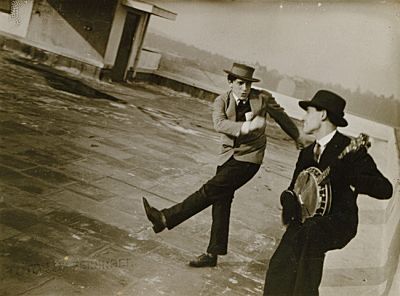
Charleston on the Bauhaus Roof
1927
Lux Feininger
_______________________
''Dancing on the Roof: Photography and the Bauhaus (1923-1929)''
Sarah Boxer
When it came to photography, angle was everything at the Bauhaus, the school of modern art and design founded by Walter Gropius in 1919, which occupied three German cities in succession -- Weimar, Dessau and Berlin -- before being snuffed out by the Nazis in 1933. Photos were snapped from above, from below, from close up and from oblique angles. They were taken upside down and sideways, through windows, through gratings, through a camera and not. But in Bauhaus photography there was one prevalent angle that many people forget: the silly one....(more)
_______________________
 Palucca Tanzt
Marianne Brandt
1929
_______________________
The Romanian Avant-Garde And Visual Poetry
new scholarship on Dada and picto-poesy
Andrei Oisteanu
Exquisite Corpse
8) In 1914, the poet Ion Vinea published in Facla magazine, a theoretical article: "A new school: The Simultaneism”. Starting with the innovation of the cubists, adopted by the futurists (the representation of the movement in a simultaneous, not in a succession), Vinea stops at Henri Barzun’s book, Voix, Rythmes et Chants Simultanés (Simultaneous Voices, Rhythms and Chants), which makes an attempt to apply the "simultaneous conception” on poetry. Thus, "to the successive we oppose the simultaneous, to monody we oppose polyrhythm, to the linear verse we oppose the visual form”. "Even if the new technique is not yet perfect – writes Vinea –, it is opening new and unsuspected horizons for the literary research. We welcome the new group for its enthusiasm and talent shown in starting the battle and wish it success in its attempt.” In the end of his article, Vinea wonders whether the "simultaneous poems” will remain "mental” or whether they will be "presented” and, possibly, "read like a musical score”.
9) The answer to Vinea’s question came exactly two years later from his very friend, Tristan Tzara, who was familiar with Vinea’s text. On the 31st of March 1916, at the Cabaret Voltaire, Tzara stages (together with Marcel Iancu and Richard Huelsenbeck ) his first "simultaneous poem”: L’amiral cherche une maison à louer. This first stage presentation of a "simultaneous poem”, proves to be what we nowadays call a "performance-poem”. The poem was published in the unique issue of the Cabaret Voltaire’s publication (Zürich, 15th of May, 1916), in an original visual form, that of a pseudo-musical score. Tzara thought it was appropriate to provide some "instructions for the use” of the simultaneous poem, adding a Note for the bourgeois to it. After a short survey of the history of the visual poem and the "principles of simultaneity” applied in visual arts, in poetry and in the theatre, Tzara exposes his own principles, which confer the simultaneous poetry "a new vigour.”
In the period between 1916-1923, Tristan Tzara made often use of various visual effects, regardless of the "visualised” text: Caligramme, 1916, La fièvre puerpérale – simultaneous poem for four voices, 1916; Froide lumière – simultaneous poem for seven voices, 1917; Astronomie – ornithomorphic calligram, about 1917-1922; Boxe I – visual poem, 1919; Bilan – visual poem, 1919; Proclamation sans prétention – visual manifesto, 1919; Une nuit d’échecs gras – visual poem-poster, 1920; DADA soulèved TOUT – visual manifesto, 1921; the theatre play Le coeur à gas – includes visual poems – was published by Tzara in Der Sturm (Berlin no.3, 1922; first representation on stage: Paris, 1921).
10) In 1922-1923, the author of the "simultaneous poems” (Tristan Tzara) and the author of the "simultaneous garments” (Sonia Delaunay) imagined together a series of garment-poems. Tzara deliberately composed a cycle of poems to be printed on garments designed by Sonia Delaunay. "Si la peinture est entrée dans la vie (if painting has entered every day life) – said Sonia Delaunay –, c’est que les femmes la portaient sur elles” (it is because the women wore it on themselves). Her statement can be paraphrased: "Si la picto-poésie est entrée dans la vie, c’est que les femmes la portaient sur elles” (If picto-poetry entered every day life, it is because the women wore it on themselves). The idea to create an "ambulant picto-poetry” certainly is an uncommon one, but not novel: in the 15th century, the poet Charles d’Orléans had his garments embroidered with of his own poems on them....(more)
_______________________

Stile and Stoops
John Parminter
_______________________
Paul Virilio's The Aesthetics of Disappearance
reviewed by Alan Ashton-Smith
The voyeur and the traveler are associated with one another; to view is to move. But sometimes there is an disappearance of both motion and viewing. The key concept introduced in The Aesthetics of Disappearance is picnolepsy – the condition of brief lapses in time, momentary absences of consciousness, in Virilio’s words, fleeting instances of life escaping. Picnolepsy is produced by speed, and is a characteristic of the pace at which we live our lives.
Virilio’s territory is vast, a terrain that could only be covered in its entirety at a supersonic speed. But he successfully negotiates myriad points of reference in a gratifying compact book. He deals not with landmarks, but with the wider landscape of the journey – the view from a car window, the moment in a train journey when one passes another train and both locomotives appear as though they are standing still, the drift between object and context. ...(more)
_______________________
A History Of The English Language
Elspeth Healey
The Germ: Germ #6/7
(....)
where does one start
in search of the first word?
fingers poised to pluck a flocculent white
blossom from a potted tree,
left hand cradling a bowl half-filled with petals,
as she looks down she observes a fissure in the stone underfoot
intrinsic to the nature of change is the passage of time
(....)
all things of beauty are also elliptical,
the oval in its perfection
over the years there have been many
who have collected words,
among them, my mother
(....)
*
there is something that the English
language will not allow me to convey,
an echoing vision
of my mother at her desk
in a photocopy that has fallen behind
the radiator the third letter is now visible
but the first obscured
between when the bowl fell and
when she too collapsed there was
an instant in which a similar emission
of light could be observed
...(more)
_______________________

Harbouring Desires
John Parminter
via La main gauche
_______________________
from
White Birds in a Black Space
Ashur Etwebi
Translated from the Arabic by Ashur Etwebi
words without borders
(....)
He said:
You know that the sea is large
and time like water seeps between fingers and nothing remains.
You know that from the lemon’s scent, a drop fell down,
filled the earth with freshness and early penetration.
You know that forests brought dates
to the lover and to the stones of joyful beaches.
The stones crashed, turned into iron flowers.
Why are you hiding inside rooms of modern cities,
full of futile noise, harvesting young breasts and swallowing saliva for ever.
The clock’s organs suspended from a hole in the wall
and the time calmly counts commas and dots
for the new morning.
A knock on the door
And behind the door
morning was standing.
Who wants the morning so early?
He said:
Looking for the stone in the water
and looking for the water in the stone.
It is I, who is optimistic in the time of fall
It is I, who loves the wheat woman
and is not scared of the death of silence.
In the crowd I eat few words
and wink to the women passing by.
I see gazelles crying
and I see happiness committing suicide in the city plaza.
I remember, how my apple turned back, naked
before the moon, and how its fear stepped back
and begged for forgiveness.
Alphabet on the wall
asking the wall to turn into ash
and not reveal the buildings’ secrets.
The buildings say as they close their doors:
When the concept is clear, the police disappear.
He said:
I didn’t go to the sea this evening.
I was stopped by a wailing stone.
Two stab wounds in its chest
I asked it: Who—?
It answered: You—.
The faces that fell down
from the cloud of life have passed this way,
broken, crying and shadowless.
The wrinkles and the old winters’ fat were taken away by the traveling ships.
He said:
I see them planting the seeds of desire,
They were kings, sitting in the cafés of silver.
I see them in the large halls, on the noble marble
featureless.
The bird that has returned home,
remained dreaming till morning,
released the olive oil traders from jail
and poured the oil.
He said:
Many will pass through these places
but the sand remains the sand.
Oh, young sand, you have become a catastrophe.
Birds of the dear country build their nests in you;
the upper houses and the lower houses flourish
and he who walked with the beating of drums
wanted to reach it.
The country has besieged all kings and betrayed the prophets.
...(more)
_______________________

Dance in Metal
c. 1928
Lux Feininger
1 2
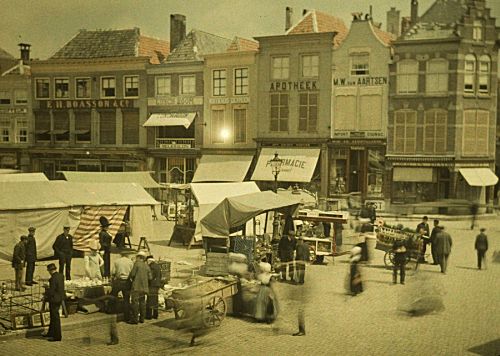
Market day at Middelburg (NL)
c. 1910
Charles Corbet
Belgian Autochromists
_______________________
Kontest Carnage
bill bissett
langwage binds us 2gethr separatelee n parts n sharing
almost replikating nevr reelee xact wun uv th biggest communal
spells we ar allbound n unbound in
ths xcellent documentaree is not th veree great ingrid bergman gregory
peck starer direktid by alfred hitchcock with dreem sequens by salvador
dali wun uv th best mooveez evr made ths spellbound is a wickid
inspiring anxious making n veree suspensful documentaree abt th
amayzing spelling beez
spelling beez start out lokal regyunal n build up 2 th nashyunal finals
like all uv th kontest worlds like dogs beautee talent politishyns
etsetera
ther ar issews uv child abuse as spelling beez ar 4 yung peopul n theyr
parents 2 struggul with ovr straining thees young peopul with
xpektaysyuns n grueling long hours uv practise n rehersal n sum folk lorik
patriotism n th desirabilitee uv fulfilling goals regardless uv place in th
race thees are sum uv th main moteefs undrlying ths compelling
narrativ a strong storee uv th kontest carnage with sew manee uv th
kontestants being droppd it can all dpend on an “i” rather thn an “a” we
follow th journeez uv 8 young peopul thru we hope 4 them n root 4
them I wunt tell yu th whol storee its a great film binding th
korrekt spelling on us like binding parts uv our bodeez shows how
fascinating words ar I was in th spelling bee world 4 a whil in halifax b4
entring th dog show world with an xcellent cockr spaniel but that’s
anothr storee chek out spellbound highlee recommendid 4/5 stars
bill bissett in GEIST Magazine
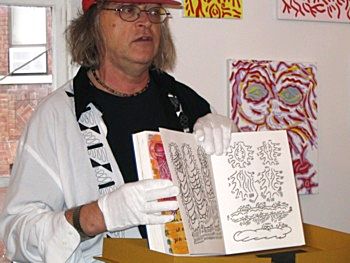 bill bissett
b. Nov. 23, 1939
th talk on lunaria hand kraftid book
photo by Sandra Alland
bill bissett documentary 1 2 3
national film board
bill bissett and BP Nichol - Interviewed by Phillis Webb 1 2
Visual Poetry In Canada: Birney, Bissett, and bp
Jack David
Studies in Canadian Literature, Vol. 2.2 1977
bill bissett at PennSound
in the whirlwind
drawings, poems and performances by bill bisset

breath box
bill bissett
1969
Ruins in Process
Vancouver Art in the Sixties
.....................................................
they cut back sew much on th backs uv th poor
bill bissett
(....)
whats missing from my writing ar all th dramateek
konflikts prsonal we all struggul with how we
escape th crueltee or non rewarding dominans
uv othrs thru we being harsh ourselvs squel 4
our freedom from bull shit skreem 4 our demands
that we b lovd not always rite on sumtimes we ovr
reakt mor drama we ar all such devoteez uv evn
bside th endless atlantik we ar such fish stik toddlrs
bside we caree on all th strugguls duelistik layr
ing uv kontradiktoree tapestereez n eventualee let
go evreewuns konfusd n feeling th guidans n
wondring what is it all th blessings th pain th
journeez th sun bakes us 4give n love n find
as a demand that will seldom work honestlee we need
2 rewrite it make let it glow mor will i evr go
back aftr sumwuns bin harsh 2 me sumtimes its
eazier thn othrs th sun can reapeer it was all a
ms mistr undrstanding othr times its just not
possibul try not 2 think uv it moov on b loving
b ther wundr th road n th bus taking a suddn
curv tho th drivr knows it like th back uv his
hand thru th see saltee inkee nite ium thinking
now 4 a veree littul whil nothing is missing
evreething is alredee heer
...(more)
_______________________

Chad Gadya
(The Tale of the Goat)
1919
El Lissitzky
b. Nov. 23, 1890
_______________________
Theorizing Buddhist Scripture Translation as an Act of Giving: a Buddhist Perspective [pdf]
Sai Cheong Siu
New Voices in Translation Studies 4 (2008)
Special Conference Issue:
‘With/out Theory: The Role of Theory in Translation Studies Research _______________________
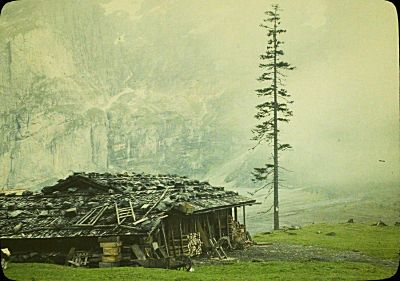
Mountain hut
Kandersteg/Switzerland
autochrome
Remi Verstreken
1909
_______________________
Solstice: A Magazine of Diverse Voices
inaugural issue
_______________________
Five North Vancouver Trees
Peter Culley
mosses from an old manse
2. All is Loch Elsewhere,
Arcadian pancake & parkade,
chewed venue, through potash
& slough
eelgrass aftertaste
past castle & ledge
where the blue bus humps
up & left, past the twinkling figurines
of a presumptive distance
even darker closer in & thickened so with
baronial fences & colonial hedges that
only from overhead can
the security corona be glimpsed
when cat-like you trip its cricket senses.
...(more)
_______________________
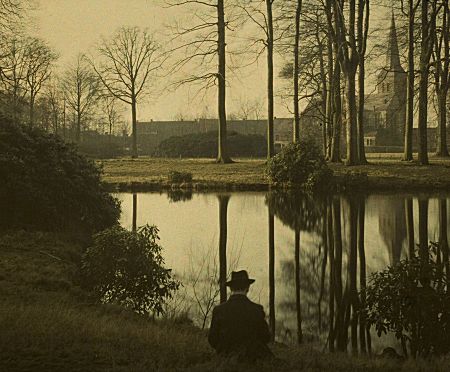
Melancholia
c. 1910
autochrome
Charles Corbet
_______________________
The Celestial Poets
from Canto General
Pablo Neruda
trans. Martin Espada
What did you do, you Gideans,
intellectualizers, Rilkeans,
mystifiers, false existential
sorcerers, surrealist
butterflies incandescent
in the tomb, Europhile
cadavers in fashion,
pale worms in the capitalist
cheese, what did you do
confronted with the reign of anguish,
in the face of this dark human being,
this kicked-around dignity,
this head immersed
in manure, this essence
of coarse and trampled lives?
...(more)
courtesy of Philip Metres
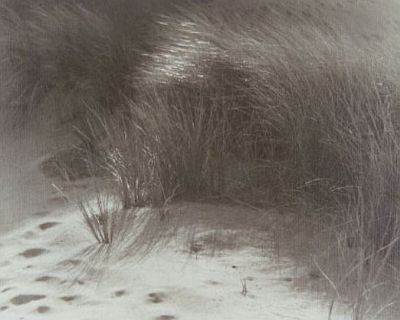
Beach Grass
c. 1920
William Dassonville
1879-1957
1 2 3
via Kostis Velonis
_______________________
from
Lost Signatures (Book Of Jack Gilberts & Fernando Pessoas)
Peter Boyle and MTC Cronin
Sibila
When the sheep stop feeding
for Fernando Pessoa
Little sheep with their trusting forms of address,
a dozen of them grazing placidly
on fine-spun clouds you left in stalls for them
all over the space of winter
and the fragile years of sojourning.
Nibbling on the very least a shepherd might give –
grain from an open hand, sun and water,
the tough resilience of a gaze that walks
between the starved moon and night’s emptiness.
Nourished from the same soil
as your own wayward fracturing,
they feasted long on sun-ripened air
but then, like innocence itself
once it bathes and takes food among us,
slowly and strangely they lost themselves,
became boulders on a mountain pass,
an old car abandoned in a field,
a cypress caressing a waterfall,
shrinking and glittering
as distance transformed them.
On the day they stopped feeding
you offered them the fingers of your hand
while their eyes travelled past you
uncomprehending
dwelling already far ahead in the past. more
Sibila
Sibila's English Portal
Charles Bernstein, Editor
_______________________
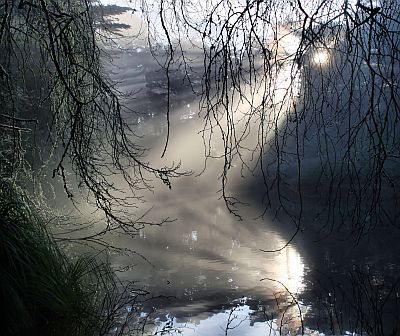
Mila Zinkova
_______________________
Eight Vietnamese poets
Selected by Linh Dinh
sibila
from
Marsh Dream
Nguyen Quoc Chanh
III
Broken fuse.
Night smoothes out protuberances and fills in hollows.
Disparity aches the entire line in back of the ears throat navel tail bone groin
and an open toilet.
The savior sits.
Concepts are a constraining helmet insects catching prey by a system of
shutting tight.
Imagination and thoughts eternally nourished.
Man with a thick shadow does not hear the air breaks to clear a road to the cemetery
Look into one spot.
Staring and contemplating is to enter a train car without passengers.
Imagination thrown into a blinding interval everything rises.
A straight movement eliminates dampness and dries out the viscera.
A shadow creakily swinging a hammock.
The sound of darkness moving drenched in lubricating oil.
Kinship is declared through hastily carved bas relief where air-hating insects worship.
Gnawing epoch.
Suck marrow.
Product of cohabitation disobedient shard of instinct pressures of an offshoot forest.
A curt hand.
Memory opens its compass and a train car without passengers.
The past has extra tickets.
Centuries not transported.
...(more)
_______________________

Innukshuk Builders
1967
Pitseolak Ashoona
Pitseolak: pictures out of my life
from recorded interviews by Dorothy Harley Eber
google books
_______________________
Cloudy, Chance [pdf]
Richard Hoffman
janus head
He goed, god if he was he seemed sum a way,
knot turning a g(r)ain, the shaper, O ver, O pen
ultimatum: now you have it, now drips the net, be
great, full, timorousness last life, must learn
for word, fore sign, and note no thing not a
live, outcrying outloud, until alone you know.
*
Can one (for if one can then any can) misbe?
Some have come to that, sum of have, of want
fell short and fell hard once and for all from
highnesses, the view from there a horror. Weigh
to go, swung bubbly broken, and wave goodbye.
But Reset is no deity, a flight, and futile too as pyre.
...(more [pdf])
Richard blogs at Mnemosyne's Memes_______________________

Blue Remembered Hills
Dennis Potter
youtube via waggish
_______________________
Zombie Politics and Other Late Modern Monstrosities in the Age of Disposability
Henry Giroux
At present, Americans are fascinated by a particular kind of monstrosity, by vampires and zombies condemned to live an eternity by feeding off the souls of the living. The preoccupation with such parasitic relations speaks uncannily to the threat most Americans perceive from the shameless blood lust of contemporary captains of industry, which Matt Taibbi, a writer for Rolling Stone, has aptly described as "a great vampire squid wrapped around the face of humanity, relentlessly jamming its blood funnel into anything that smells like money." Media culture, as the enormous popularity of the Twilight franchise and HBO's True Blood reveal, is nonetheless enchanted by this seductive force of such omnipotent beings. More frightening, however, than the danger posed by these creatures is the coming revolution enacted by the hordes of the unthinking, caught in the spell of voodoo economics and compelled to acts of obscene violence and mayhem. They are the living dead, whose contagion threatens the very life force of the nation....(more)
A Zombie Manifesto: The Nonhuman Condition in the Era of Advanced Capitalism
Sarah Juliet Lauro and Karen Embry boundary 2 / Spring 2008
aaaarg - free reg. req.
_______________________
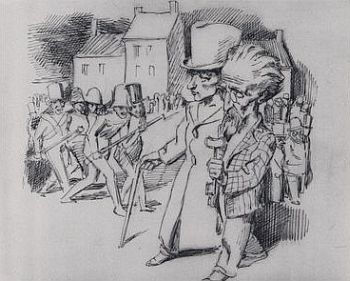
Father, Joseph, and terrorists
Bruno Schulz
1936
The Sanatorium at the Sign of the Hourglass
Bruno Schulz
(July 12, 1892 – November 19, 1942)
Translated by John Curran Davis
What more can I say? He was the first to explain the secondary, derivative character of that late formation, being nothing other than a peculiar kind of poisoning of the climate by miasmas of the over-ripe and rancid baroque art crammed together in our museums. Decomposing in boredom and oblivion, too sweet and locked in with no outlet, like old preserves, that museum art over-sugars our climate, and is the cause of that beauteous, malarial fever, those colourful mirages in which that protracted autumn agonises. For beauty, as my father taught, is a disease; it is the chill of some mysterious infection, a dark announcement of the decomposition rising up from the depths of perfection, to be hailed by perfection with a sigh of the most profound happiness....(more)
"Nothing but face" - "To hell with philosophy"?: Witold Gombrowicz, Bruno Schulz, and the scandal of human countenance
Adam Zachary Newton
The Mythologization of Reality
Bruno Schulz
Translated by John M. Bates
The human spirit is tireless in its glossing of life with the aid of myths, in its 'making sense' of reality. The word itself, left to its own devices, gravitates towards meaning. Meaning is the element which bears humanity into the process of reality. It is an absolute given. It cannot be derived from other givens. Why something should appear meaningful to us is impossible to define. The process of making sense of the world is closely connected with the word. Speech is the metaphysical organ of man. And yet over time the word grows rigid, becomes immobilized, ceases to be the conductor of new meanings. The poet restores conductivity to words through new short-circuits, which arise out of their fusions. The image is also an offshoot of the original word, the word which was not yet a sign, but a myth, a story, or a meaning....(more)
_______________________
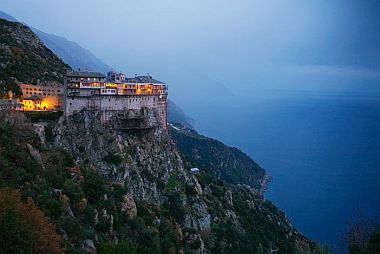
The Monks of Mount Athos
Robert Draper
Photography by Travis Dove
national geographic
Redoubt of the reclusive, Simonos Petras monastery was founded in 1257 more than 800 feet above the Aegean Sea. It is one of 20 monasteries on the steep-sloped peninsula, a popular pilgrimage site sometimes called the Christian Tibet.
Laced by rustic paths still traveled on foot and by mule, the enclave's low-tech serenity attracts tens of thousands of pilgrims yearly-men only. Dedicated to the Virgin Mary, the peninsula is off-limits to all women and the temptations they might represent. via tawny grammar
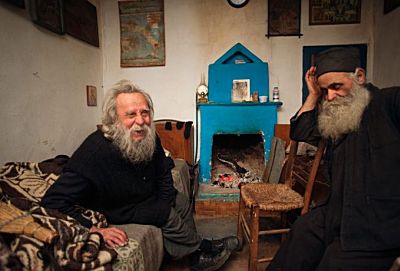
These two monks have shared the same small cell for more than 50 years. Humor helps maintain harmony, as does respect for seniority. Father Nektarios (at left) says of Father Christoforos, "He's followed my will as the elder all these years."
.....................................................
Time, Space, Source Material, and Methods
chapter one of
Portrait of a Priestess: Women and Ritual in Ancient Greece
Joan Breton Connelly
Princeton University Press
_______________________
Two Late Poems by Robin Blaser
sibila
I've caught the unease
of old age in my hands
and wrung it dry
in order to remain
within its kaleidoscope,
there to collide among all colours
of kalos--beauty
of eidos--form
of skopos--watcher of
lovers of
irreparables
Robin Blaser (1925-2009)
_______________________

Tug & Log Boom
William Dassonville
1925
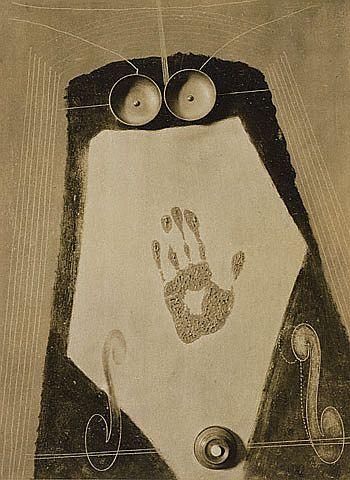
Self-Portrait Assemblage
1916
Man Ray
d. November 18, 1976
_______________________
Nietzsche/Derrida, Blanchot/Beckett: Fragmentary Progressions of the Unnamable
Stephen Barker
pmc
What is the work of which the marginal, the parergonal, the fragmentary, is outside? How is one to map this exchange, of terms and of texts, and how will this economy of the marginal, the transgressive, the nameless, or unnamable, operate within the aestheticized space of writing and reading?
_______________________

Janus Head
Volume 11, Issues 1 & 2
What’s the ‘Matter’ with Materialism? [pdf]
Walter Benjamin and the New Janitocracy
Dan Mellamphy and Nandita Biswas Mellamphy
janus head
This paper examines Walter Benjamin’s argument that the matter—the materials
—of materialist historiographyare the objects that have been forgotten and discarded
by modern bourgeois commodity culture. Just as Benjamin saw in child’s play and
children’s playthings a potential ‘playing out’ and ‘recollecting’ of that which has been
dropped, left behind, forgotten and forsaken, he likewise saw the historical endeavor
as one which engaged the discarded materials of bourgeois culture and cut through
progressivist, universalist history—revealing in so doing a materialist and indeed
‘messianic’ history. The consequences of this redemptive relation (these redemptive
relations) are drawn out in the essay and culminate in the figure of the revolutionary
custodian and the ‘New Janitocracy’.
_______________________
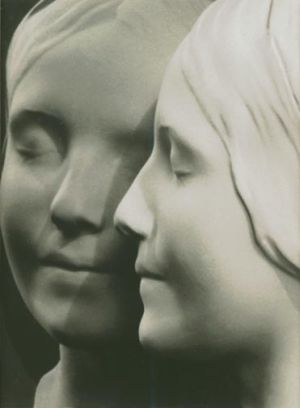
Man Ray
1945
Influence and authenticity of l'Inconnue de la Seine
Anja Zeidler
The Gaddis Annotations
_______________________
A Part Of You Lives On
Robert Gibbons
To live life so well, so rough-hard-edged, indelibly marked, indefinable, invisibly anonymous, private public, generous humble loving, experiential traveled leading children right into themselves, seeking secrets, knowing fast, as well as full, the abject & ecstatic, valuing Art, cherishing the rarity of friendship, rarer than Love, the sea & prairie, or ice cap & tundra, appreciating music as natural innate inspired & constructed, no dropping names, & no false notes in speech, the Truth honed close to bone, real Freedom, deep, against those closest, as well as those unseen at the top, voiced gratitude at every turn, risk taking to the max inviting loss & defeat, those grand teachers, no kowtowing to power, avoiding the rich, if need be, so that then when death comes a part of you lives on, because to live life so well, hard-edged, subtle, discreet, intuitive, indelibly marked, indefinable, invisible, anonymous, private public, generous humble loving, experiential traveled leading children right into themselves, seeking secrets, knowing fast, as well as full, the abject & ecstatic, valuing Art, cherishing the rarity of friendship, rarer than Love, the sea & prairie, or ice cap & tundra, appreciating music as natural innate inspired & constructed, no dropping names, & no false notes in speech, the Truth honed close to bone, real Freedom, deep, against those closest, as well as those unseen at the top, voiced gratitude at every turn, risk taking to the max inviting loss & defeat, those grand teachers, no kowtowing to power, avoiding the rich, if need be, so that when death finally comes, whether suddenly, or after the long ago, a part of you lives on in recollections of others, in things crafted or collected, in long-lost photos, in histories & myths, in the unrecorded & recorded records, will, letters, diaries, notebooks, love letters, write those love letters now so both of you live on, when death comes, whether suddenly, or after the long agon a part of you lives on.
Prose poems [pdf]
Robert Gibbons
janus heade
_______________________
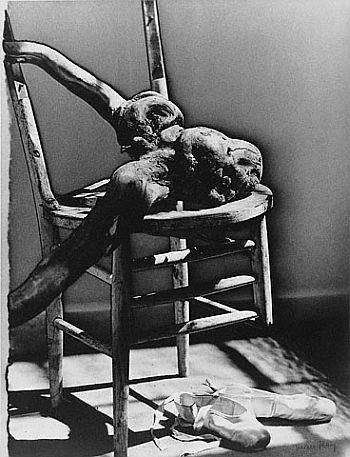
Broken Chair with Stump
and Ballet Shoes
Man Ray
1942
_______________________
The International Literary Quarterly
November 2009
Volta: A Multilingual Anthology
(One poem: 75 languages)
Border/Lines: an Introduction
Richard Berengarten
7.
Translators, wherever they happen to live, inhabit border/lines. Translators are edge-people, bridge-makers. Translation is edge-action, frontier-culture, margin-work. And the border/lines that a translator constantly criss-crosses and transgresses, the shifting zones over and through which a translator zigzags, are located in the mind. The contours and colorations that a translator discerns in zones of mentation are mapped on both exterior and interior listening and observation; and the internal listening and observation are predicated in memory, emotion and intuition. Furthermore, the spaces the translator finds and opens in those zones, and the patterns the translator makes in them, are not just linguistic. For the translator’s (or translating team’s) necessary bilingualism itself means that the spaces in those zones are interlingual, infra-lingual, even metalingual.
.....................................................
Volta
Richard Berengarten
. . . now that dusk falls . . .
King sun, rosy cheeked, day's sovereign coin,
you touch me, and my skin becomes a cornea,
my spine an optic nerve, and my body trembles
half dazzled by the pool of gold you pour
over this sea and city, and I'm blinded.
Here once stood rows — and still I know they stand —
of houses and streets, belonging to another city,
not this one you have utterly transformed.
We walk along the waterfront. The night
fishermen's boats are ready to set out,
motors chugging, paraffin lamps in the bows,
and the whole town's out for the promenade,
lovers arm in arm, and young men swaggering,
mothers and fathers, children eating ice-cream,
old men watching from tables at pavement cafes,
and the darkening hills move closer, like friendly animals.
Sweet evening skyglow, spread on hills and bay,
your arm grazes mine now, as if by accident,
like the touch of this young woman who walks beside me
with heavy hips, small steps and swinging gait,
jet hair swept back, delicate throat and shoulders
deep summer bronzed, and her olive brown eyes laughing.
I drink you, shimmering light, like wine, like music,
as her ancestors have drunk you thousands of years.
Porous city, her name is Eleftheria,
and though your scars are grey flecks in her eyes,
still, at this hour when light and light's inflections
play subtly in her face as speech or song,
hers is the ancient right to walk this quayside
as instrument and guardian of your light
collecting it in the wells of her deep pupils,
and hers, the darling freedom, to tread you like a dancer.
Darling evening, light thousands of years old,
clear throated singer, lovely as this woman,
how can I not adore the grace you cast
this city and its people in, a mould
that sculptures all it touches, the whole world?
I have become your slave, if not your citizen.
And thirsting to drink you wholly, I would fill
every pore with your radiance, her freedom.
_______________________
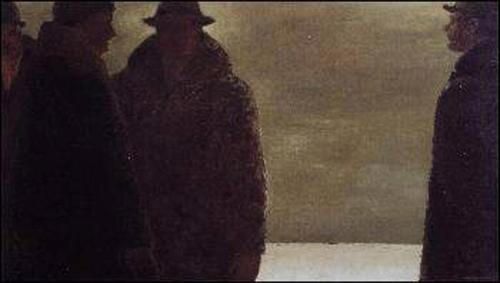
La Conversation
1968
Jean Paul Lemieux
(18 November 1904 - 7 December 1990)
_______________________
from
The Spell Against Spelling
(a poem to be inscribed in dark places and never to be spoken aloud)
George Starbuck
(....)
You see, there are Spellers in this world, I mean mean ones too.
They shadow us around like a posse of Joe Btfsplks
Waiting for us to sit down at our study-desks and go shrdlu
So they can pop in at the windows saying "tsk tsk."
I know they're there. I know where the beggars are,
With their flash cards looking like prescriptions for the catarrh
And their mnemnmonics, blast 'em. They go too farrh.
I do not stoop to impugn, indict, or condemn;
But I know how to get back at the likes of thegm.
For a long time, I keep mumb.
I let 'em wait, while a preternatural calmn
Rises to me from the depths of my upwardly opened palmb.
Then I raise my eyes like some wizened-and-wisened gnolmbn,
Stranger to scissors, stranger to razor and coslmbn,
And I fix those birds with my gaze till my gaze strikes hoslgmbn,
And I say one word, and the word that I say is "Oslgmbnh."
...(more)
_______________________
The Day of the Condour, or
How to be a Propour Canadian Spellour
Ronald de Sousa

Okawa Village
Kochi Prefecture
Toshio Shibata
1 2 3 _______________________
Justifying the Margins
Pierre Joris
salt
Excerpt from book: Nimrod in Hell
... his words, no matter which language or nonlanguage they are in, are fitting in a further sense: they are babble, thus a babelian bavel, and thus connect to bave, Fr. for drool, spittle. A false etymology—but are any etymologies really “false”? Aren’t they the engine whose misfirings, rather than smooth transparent linguistic runs, drive poetry forward? A false etymology, then, possibly, but one that brings in that much despised excretion without which we would have no language. And now, looking up the etymology of “bave” it turns out that the word goes back to pop. Latin “baba”, an “onomatopoeia that expresses the babble [le babil] of children.” Or of giants. Or of the single universal language all humans once spoke in their lingo-genetic childhood. Now this bave, this spittle, this active saliva (doesn’t the word “alive” hide somewhere in “saliva”?), as George Bataille’s Encyclopedia Acephalica teaches us, is “the deposit of the soul; spittle is soul in movement.” For spittle accompanies breath, “which can exit the mouth only when permeated with it.” Because “breath is soul, so much so that certain peoples have the notion of ‘the soul before the face.’“ Without spittle, no breath, no soul, no language—it is the lubricant that immanentizes the pneuma. But it is also, the EA goes on, that which “casts the mouth in one fell swoop down to the last rung of the organic ladder, lending it a function of ejection even more repugnant than its role as gate through which one stuffs food.” And its sexual connotations and erotic manifestations allow it to befuddle any hierarchical classification of organs. The EA again: “Like the sexual act carried out in broad daylight, it is scandal itself, for it lowers the mouth—which is the visible sign of intelligence—to the level of the most shameful organs…” The scandal of children and giants speaking in a language comprehensible (or incomprehensible) to all, like spitting in public. Neither YHWH nor Dante can let this happen. The one shatters the single language, the other gathers the now incomprehensible words of the giant hunter Nimrod but makes them, has to make them fit into his language, wiped clean of spittle.
For Nimrod’s languaged anguish cannot, and does not exceed the Dantean world, it fits exactly into the cosmotopography of his lyric epic. It is metrically exact and accurately rimes with “palmi” two lines above and “salmi” two lines below. Gentle giant, speaking nonsense in comely divine words. Not surprisingly the prissy Latin poet wants worse from Nimrod, telling him “Stupid soul, keep to your horn,” and dismissing him thus: “Let us leave him alone and not speak in vain, for every language is to him as his is to others, which is known to none.” Yet Nimrod in rage hunts still—for meaning, and he says his meaning.
Poet, translator: meme combat! We keep hunting among stones .........(more)
.....................................................
Pierre Joris interview
Mark Thwaite at ReadySteadyBook
Pierre Joris' blog - Nomadics
_______________________
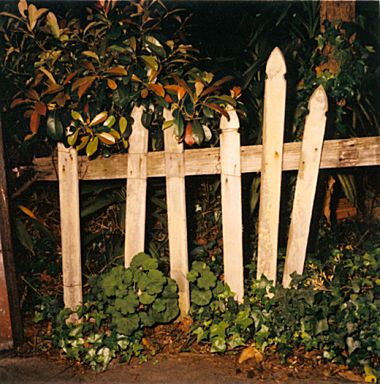
Picket Fence
2003
Glenn Sloggett
Stills Gallery
_______________________
Contingency, Irony, and Solidarity
Richard Rorty
aaaarg - free reg. req.
If we could bring ourselves to accept the fact that no theory about the nature of Man or Society or Rationality, or anything else, is going to synthesize Nietzsche with Marx or Heidegger with Habermas, we could begin to think of the relation between writers on auronomy and writers on justice as being like the relation between two kinds of tools - as little in need of synthesis as are paintbrushes and crowbars. One sort of writer lets us realize that the social virtues are not the only virtues, that some people have actually succeeded in re-creating themselves. We thereby become aware of our own half-articulate need to become a new person, one whom we as yet lack words to describe. The other sort reminds us of the failure of our institutions and practices to live up to the convictions to which we are dready committed by the public, shared vocabulary we use in daily life. The one tells us that we need not speak only the language of the ribe, that we may find our own words, that we may have a responsibility to ourselves to find them. The other tells us that that responsibility is not the only one we have. Both are right, but there is no way to make both speak a single language.
This book tries to show how things look if we drop the demand for a theory which unifies the public and private, and are content to treat the demands of self-creation and of human solidarity as equally valid, yet forever incommensurable. It sketches a figure whom I call the "liberal ironist."
also available at aaaarg - Rorty's Philosophy as Cultural Politics and Objectivity Relativism and Truth
_______________________

Matsuyama City
Ehime Prefecture
Toshio Shibata
Interview with Toshio Shibata
eyecurious
_______________________
from
Six Prose Poems from Four’sCore
Crag Hill
otoliths
“Love is just the language of thinking?” “But it doesn’t feed you.” The problem raised the problem of the spirit. The mailman dismounted Hegelianism and, from his pocket, snatched up all the Germans in harmony. They had a ball. I knew it to be water–earthier, not so afraid–and stood upon the shore, parrots beautiful as a dream. Keys chittered in their cages. The lake was a long oval, the fragments of newsprint, urine. I listened for sound cut off, curtains.
...(more)
_______________________

Sylvia Beach opens Shakespeare & Co
8, rue Dupuytren
Nov. 17, 1919
photo 1920
_______________________
Mourning tongues
Robyn Creswell on Mahmoud Darwish
Darwish’s late verse is, in its own way, a meditation on the ways is which the self becomes a stranger to itself, becomes full of voices that are not its own. One of his most charming poems on this subject is The Dice Player (also translated by Hammami and Berger in their edition of Mural). In this long, quasi-autobiographical lyric, Darwish reflects on the many accidents of genealogy and history that conspired to make him who he is, or was, and how easy it would have been for him to turn out otherwise, or never to have existed at all. (“It’s possible that poetry might have gained more / if precisely this poet hadn’t existed,” he wryly shrugs.) In this way, the poem also becomes a matter of chance: not an act of random creation but, like the self, a complicated result of the place where one happens to be born, the language one happens to speak, the poems one has read, and the friends one makes along the way. The Dice Player is, appropriately, the centrepiece of Breytenbach’s collection. His voiceover ensures that the poem never really comes to an end, that it remains open to further transformations and translations, further accidents of history and strokes of luck. Here is Darwish, via Hammami and Berger (and Mallarmé):
This poem is a dice throw
onto a board of darkness
that glows and doesn’t glow
words fall
like feathers on sand.
I don’t think it was me who wrote the poem.
...(more)
_______________________

Daniel Augschöll
via Heading East
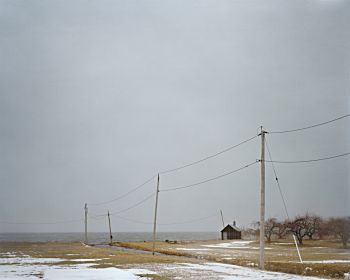
Colonized Waterways - Lake Ontario
Michael Fuchs
Joerg Colberg
_______________________
Conversation with Raoul Vaneigem
Hans Ulrich Obrist
Translated from the French by Eric Anglès
RV: I would first like to clarify that situationism is an ideology that the situationists were unanimous in rejecting. The term “situationist” was ever only a token of identification. Its particularity kept us from being mistaken for the throngs of ideologues. I have nothing in common with the spectacular recuperation of a project that, in my case, has remained revolutionary throughout. My participation in a group that has now disappeared was an important moment in my personal evolution, an evolution I have personally pressed on with in the spirit of the situationist project at its most revolutionary. My own radicality absolves me from any label. I grew up in an environment in which our fighting spirit was fueled by working class consciousness and a rather festive conception of existence. I found Lefebvre’s Critique of Everyday Life captivating. When La Somme et le reste [The Sum and the Remainder] was published, I sent him an essay of sorts on “poetry and revolution” that was an attempt to unify radical concepts, Lettrist language, music, and film imagery by crediting them all with the common virtue of making the people’s blood boil. Lefebvre kindly responded by putting me in touch with Guy Debord who immediately invited me to Paris. The two of us had very different temperaments, but we would agree over a period of nearly ten years on the need to bring consumer society to an end and to found a new society on the principle of self-management, where life supersedes survival and the existential angst that it generates.
HUO: Which situationist projects remain unrealized?
RV: Psychogeography, the construction of situations, the superseding of predatory behavior. The radicality, which, notwithstanding some lapses, never ceased to motivate us, remains a source of inspiration to this day. Its effects are just beginning to manifest themselves in the autonomous groups that are now coming to grips with the collapse of financial capitalism.
HUO: The Situationist International defined the situationist as someone who commits her- or himself to the construction of situations. What were those situations for you, concretely? How would you define the situationist project in 2009?
RV: By its very style of living and thinking, our group was already sketching out a situation, like a beachhead active within enemy territory. The military metaphor is questionable, but it does convey our will to liberate daily life from the control and stranglehold of an economy based on the profitable exploitation of man. We formed a “group-at-risk” that was conscious of the hostility of the dominant world, of the need for radical rupture, and of the danger of giving in to the paranoia typical of minds under siege. By showing its limits and its weaknesses, the situationist experience can also be seen as a critical meditation on the new type of society sketched out by the Paris Commune, by the Makhnovist movement and the Republic of Councils wiped out by Lenin and Trotsky, by the libertarian communities in Spain later smashed by the Communist Party. The situationist project is not about what happens once consumer society is rejected and a genuinely human society has emerged. Rather, it illuminates now how lifestyle can supersede survival, predatory behavior, power, trade and the death-reflex....(more)
_______________________
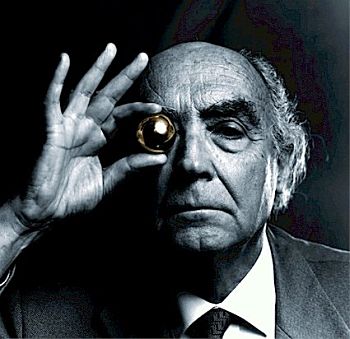
José Saramago
b. 16 Nov. 1922
How Characters Became the Masters and the Author Their Apprentice
José Saramago
Nobel Lecture, December 7, 1998
Translated from the Portuguese: Tim Crosfield and Fernando Rodrigues
...sometimes, on hot summer nights, after supper, my grandfather would tell me: "José, tonight we're going to sleep, both of us, under the fig tree". There were two other fig trees, but that one, certainly because it was the biggest, because it was the oldest, and timeless, was, for everybody in the house, the fig tree. More or less by antonomasia, an erudite word that I met only many years after and learned the meaning of... Amongst the peace of the night, amongst the tree's high branches a star appeared to me and then slowly hid behind a leaf while, turning my gaze in another direction I saw rising into view like a river flowing silent through the hollow sky, the opal clarity of the Milky Way, the Road to Santiago as we still used to call it in the village. With sleep delayed, night was peopled with the stories and the cases my grandfather told and told: legends, apparitions, terrors, unique episodes, old deaths, scuffles with sticks and stones, the words of our forefathers, an untiring rumour of memories that would keep me awake while at the same time gently lulling me.(...)
In one sense it could even be said that, letter-by-letter, word-by-word, page-by-page, book after book, I have been successively implanting in the man I was the characters I created. I believe that without them I wouldn't be the person I am today; without them maybe my life wouldn't have succeeded in becoming more than an inexact sketch, a promise that like so many others remained only a promise, the existence of someone who maybe might have been but in the end could not manage to be.(...)
Blind. The apprentice thought, "we are blind", and he sat down and wrote Blindness to remind those who might read it that we pervert reason when we humiliate life, that human dignity is insulted every day by the powerful of our world, that the universal lie has replaced the plural truths, that man stopped respecting himself when he lost the respect due to his fellow-creatures. Then the apprentice, as if trying to exorcise the monsters generated by the blindness of reason, started writing the simplest of all stories: one person is looking for another, because he has realised that life has nothing more important to demand from a human being. The book is called All the Names. Unwritten, all our names are there. The names of the living and the names of the dead.
I conclude. The voice that read these pages wished to be the echo of the conjoined voices of my characters. I don't have, as it were, more voice than the voices they had. Forgive me if what has seemed little to you, to me is all....(more)
.....................................................
José Saramago: Death Takes a Breather
Goodloe Byron
The Portuguese writer Jose Saramago describes humanity with the same alien fascination with which the Belgian naturalist Maurice Maeterlinck used to describe insects. This foreign view of civilization is entirely appropriate, as Saramago looks less like a man than a Methuselahan turtle, peering around with a goggly apparatus strapped to his temple.
In Saramago’s view, the world is not balancing on a precarious pin, but is pinned to the floor by violence and power. Suddenly, the impossible becomes possible: Blindness comes to replace selective attention with something that no longer selects anything; private regret transforms into public lucidity in Seeing. In The Cave, the Vegas/Wal-Mart/Condominium/uber-complex called The Center, a simulacra of Plato’s Cave, is built atop a buried allegorical site which realizes the simile as a literal state of being. But in these novels, society also accommodates the intruding impossibility: the blind are quarantined in dark cells; lucidity is diffused by propaganda, and the cave is turned into a spectacle itself. Since Blindness, Saramago’s seemingly impossible inspirations have become finely attuned Chestertonian paradoxes, and these situations, in turn, break the smooth surface of reality, exposing the tender and often stupid mess underneath. He’s studying the human being by injecting our world with an unstable but vivid isotope....(more)
The Unexpected Fantasist Fernanda Eberstadt
José Saramago's blog
José Saramago at the ScriptoriumThe Modern Word
Blindness and Seeing
José Saramago google books_______________________
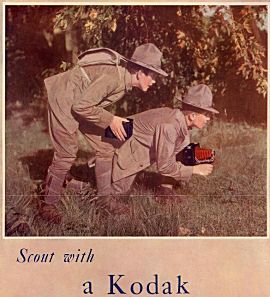
Ellis Collection of Kodakiana (1886 - 1923)
Emergence of Advertising in America
Duke Digital Collections
_______________________
Henry Gould on Unjustly Neglected Ph.D. Monographs and the American Sublime
guest post at digital emunction
Before there was a grafting, by that Minnesota poet Robert Bly and others, 50 years or so ago, onto American poetry, of semi-sophisticated, wire-limbed, thin-shanked surrealism, there was a (perhaps one-sided) debate going on, mid-century, between the New Critical orthodoxy, of Wimsatt & Beardsley, Ransom & Brooks & Tate et al., on the one hand, and one of the founding & now former critics in that wave, R.P. Blackmur, and his foremost disciple, John Berryman, on the other. This confrontation between differing ideas about the character and means of poetry is one of the main topics of a perhaps-neglected work of scholarship, published in 1984, by Bloom. No, not Harold Bloom – rather, a fellow named James D. Bloom. The book is titled The Stock of Available Reality : R.P. Blackmur and John Berryman (Cranbury, NJ : Associated University Presses, 1984).(....)
How does this debate concern us today? ...(more) Henry's blog - HG Poetics
_______________________

photo - mw
_______________________
from
The Anti-Orpheus [PDF]
a notebook
Robert Sheppard
Shearsman Books
Poetry interrupts history, musicates the `facts',
makes the said of hegemonic (or non-hegemonic) history
the saying of poetry,
which will create anew; mutually interruptive
a new said of non-history
for only the said may bear witness.
against amnesia not by covering the past
or by re-covering it
but by allowing a utopian counter-memory
to refute and argue with historical events.
against anaesthesia by keeping the poetry
of saying saying saying,
the reader assembles the par/s/ts.
a history must always be shown
_______________________
Poetic Sequencing and The New: Twentieth Century Blues
Robert Sheppard
The epigraph for the entire Twentieth Century Blues project -- the chance of there being a book, a single volume, of that title at the head of which it could stand is remote -- comes from JM Coetzee's Waiting for the Barbarians (1980). The disgraced imperial magistrate who is the novel's narrator, is forced to explain his archeological interests (in particular, indecipherable texts he had collected) which have alerted his authoritarian captors' suspicions:
They form an allegory. They can be read in many orders. Further, each single slip can be read in many ways. Together they can be read as a domestic journal, or they can be read as a plan of war, or they can be turned on their sides and read as a history of the last years of the Empire -- the old Empire, I mean. (p 112)
His explanation is ironically barbed, of course, but his sense of the subversiveness of the marginal or of that which cannot readily be decoded into the violent simplicities of bureaucracy is affective, and provides me with a useful analogy for Twentieth Century Blues. We can all read the object, assemble, re-assemble, it in our own way(s). This will, of course, be affected by our acquired knowledge, our perceptual schema, and by the means of the text's availability, not an irrelevant question for the non-canonical poet, relying upon fugitive small presses. We all have to start reading with what we can get, as Allen Fisher realised....(more)
Complete Twentieth Century BluesRobert Sheppard Salt Publishing
Complete Twentieth Century Blues
Robert Sheppard
reviewed by Todd Nathan Thorpe
jacket _______________________
"Now it is quite clear to me that there are no solid spheres in the heavens, and those that have been devised by the authors to save the appearances, exist only in the imagination."
-
Tycho Brahe, b. 14 December 1546
_______________________

photo - mw
|


 Janus Head
Janus Head

 The Age of Briggs & Stratton
The Age of Briggs & Stratton

























































